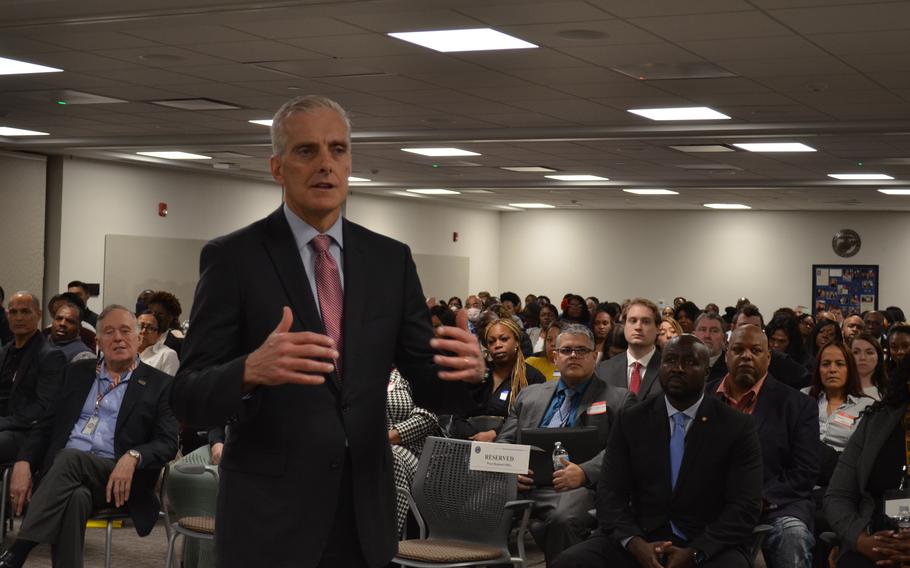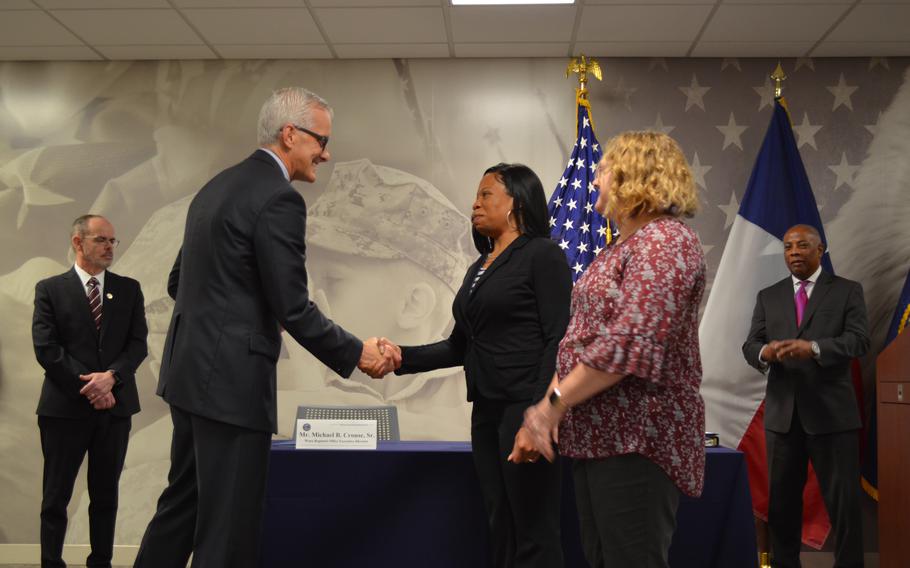
Department of Veterans Affairs Secretary Denis McDonough said Thursday, Feb. 9, 2023, that the Veterans Benefits Administration will hire 1,900 new employees to help process claims filed in response to a new law that allows benefits for toxic exposure. He spoke to job seekers at the Waco VA Regional Office in Texas. (Rose L. Thayer/Stars and Stipes )
WACO, Texas — The Department of Veterans Affairs has the funding needed to provide newly expanded toxic exposure benefits to veterans, but it needs more workers to help process the claims, VA Secretary Denis McDonough said Thursday.
“That's why we need you," he told a room filled with job seekers at a hiring fair at the Waco VA Regional Office.
The event was the second of eight hiring fairs scheduled across the country with the Veterans Benefits Administration to fill about 1,900 positions to rate claims made by veterans for toxic exposure benefits.
Hundreds of people waited in long lines hoping to get one of the 115 jobs available in Waco. The VA said it expected about 600 people to show up by the end of the day. At a hiring event Tuesday in Bay Pines, Fla., 127 people were offered jobs.
The ramp up of the agency workforce is in response to the Sgt. 1st Class Heath Robinson Honoring Our Promise to Address Comprehensive Toxics Act of 2022, or PACT Act.
The law was signed in August and seeks to provide an easier path to health care and benefits for veterans who served near open-air burn pits, which were used throughout the 1990s and the post-9/11 wars to burn garbage, jet fuel and other materials. Veterans diagnosed with cancer, respiratory issues and lung diseases at young ages have blamed exposure to the toxic fumes from these pits, but the VA contended for years that there wasn’t sufficient evidence to support their claims.

Department of Veterans Affairs Secretary Denis McDonough addresses a room full of job seekers Thursday, Feb. 9, 2023, at the Waco VA Regional Office in Texas. More than 600 people lined up for 115 jobs available to help process toxic exposure claims from veterans. (Rose L. Thayer/Stars and Stripes )
The PACT Act states veterans diagnosed with certain health conditions who served in regions known for using burn pits at certain times are assumed to have contracted the illness there from toxic exposure, and they are now entitled to benefits. The new law also expands the list of health conditions, including asthma, chronic bronchitis and certain cancers.
More than 4 million veterans served from 1991 through 2021 in regions identified in the law where burn pits were used, McDonough said. More than 300,000 claims have been filed for toxic exposure since the new law took effect, he said. In addition, Congress created a $5 billion Toxic Exposure Fund to support the increased demand expected for VA benefits.
“At VA, we are fighting like hell to deliver those [benefits], and we're investing in our workforce to deliver them because it's going to bring generations of new vets into VA health care,” McDonough said.
The VA also will need to hire about 50,000 clinicians in the next year to support those veterans once their claims are approved and they have access to VA health care services, according to the Veterans Health Administration.
Applicants are asked to fill out applications for three different jobs before arriving at the VA hiring fairs. Once they are at the fair, candidates are interviewed, fingerprinted for a background check and possibly offered a job.

Department of Veterans Affairs Secretary Denis McDonough shakes hands with Shanda Richardson, one of the first people hired Thursday, Feb. 9, 2023, at a hiring fair at the Waco VA Regional Office in Texas. Richardson, an Army Reserve veteran and VA employee, will now train for a new job rating benefit claims with the Veterans Benefits Administration. (Rose L. Thayer/Stars and Stripes. )
Shanda Richardson accepted a job within the first hour of the Waco hiring fair. The Army Reserve veteran already works for the VA as a veterans service representative and will now start training for her new job of rating claims, which comes with a pay increase, she said.
“I'm passionate about helping others. Not just veterans, but it definitely hits home for me," said Richardson, who deployed to Afghanistan as a human resource specialist before leaving the service in 2015. “The most important thing in working at the VA is having a passion to care for people.”
Getting these new hires trained and working quickly is important because veterans can qualify for more money if they apply for toxic exposure benefits before the law’s first anniversary, McDonough said. Those who do so will receive benefits backdated to August 2022, adding to the amount that they will receive.
McDonough also said veterans who are already rated 100% disabled should still file a claim. Some veterans rated 100% disabled are hesitant to file for toxic exposure benefits because they fear it could lead to losing some of their existing benefits. However, McDonough said about 95% of veterans who file for benefits for additional service-connected issues either see their benefits remain the same or increase.
Even at a rating of 100% disabled, a veteran could still be eligible for some additional benefits, he said.
“Some vets say, ‘Look, my battle buddies got worse than me. I don't want to take it from them,' " McDonough said. “The way we now can use automated decision support tools allows us to look at a lot of information, so we get a more complete picture. A vet who files today may have that piece of information that helps us complete the claim or complete the picture of other people in his unit, or people in the unit that he relieved or people in the unit that relieved him. So please file a claim.”
Six more hiring fairs are scheduled in Los Angeles, Philadelphia, Milwaukee, Nashville, Salt Lake City and Chicago.